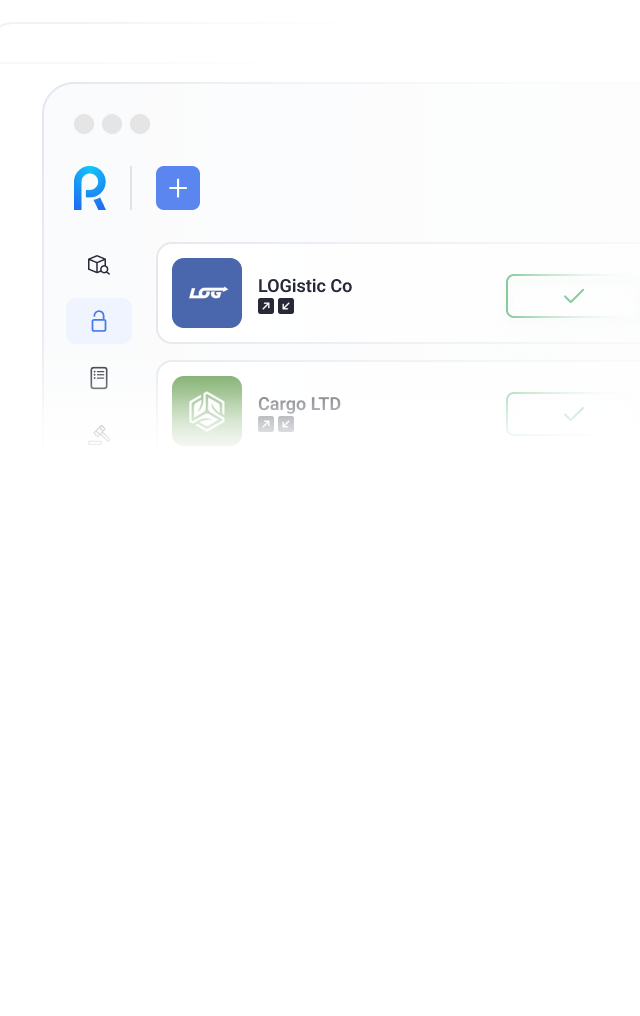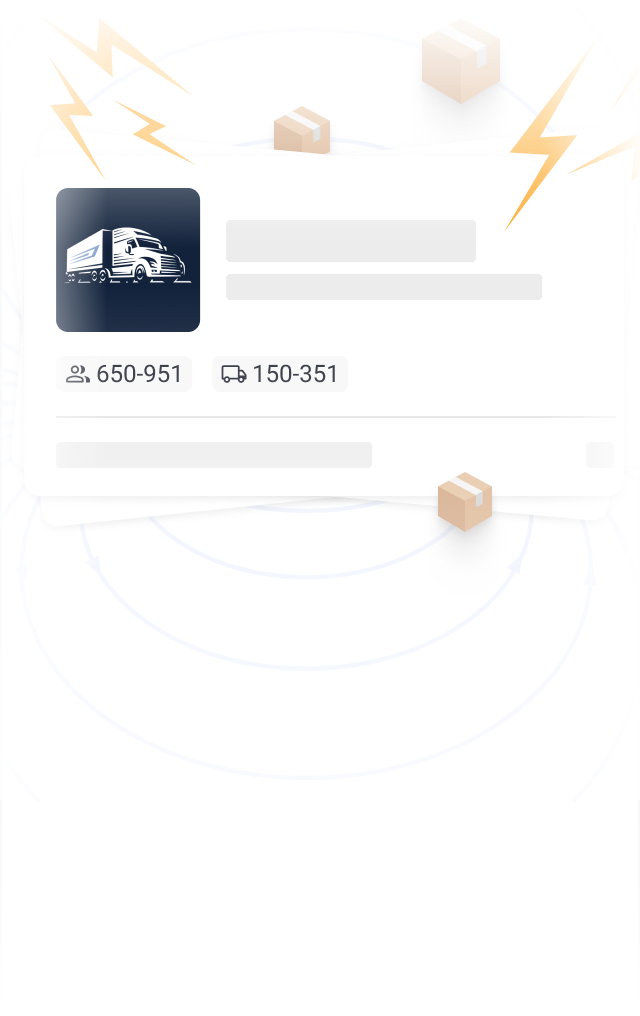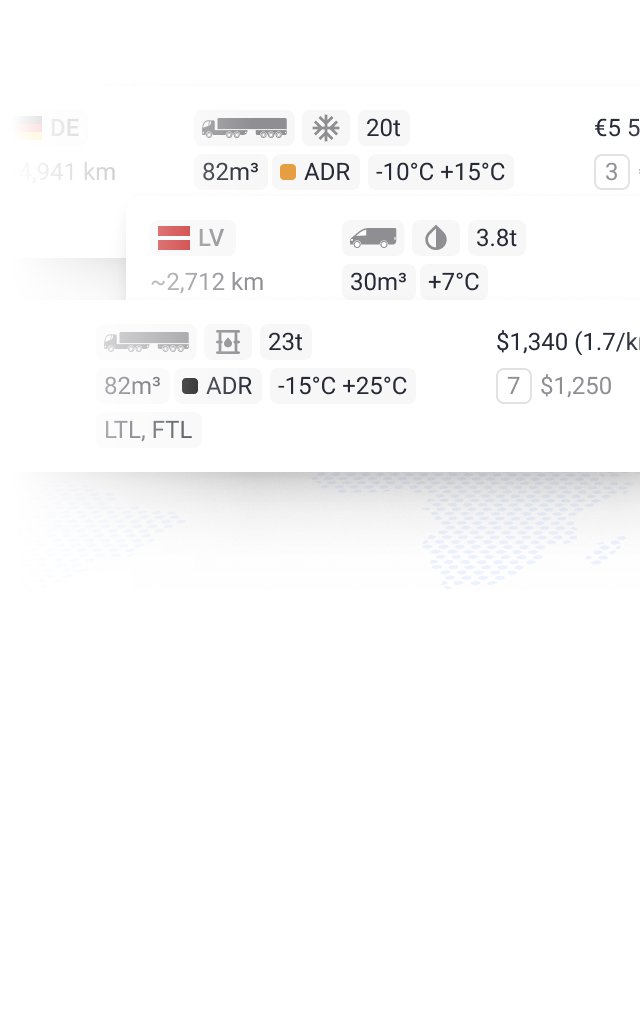
Cargo insurance services



















Cargo insurance is a service designed to protect material assets during transportation, handling, and storage. It helps minimize financial risks associated with cargo damage, loss, or delivery delays, regardless of the mode of transport used.
This service covers various stages of the logistics chain, from loading and warehousing to final delivery. The process includes:
- risk assessment based on route analysis, transport conditions, and type of cargo;
- contract signing, which outlines coverage terms;
- cost calculation and policy issuance for international shipments (CMR insurance);
- carrier (forwarder) liability insurance;
- ongoing monitoring, including tracking systems;
- loss compensation in case of an insured event.
Cargo insurance services take into account various risk factors. The insurance agent evaluates the likelihood of risks and may provide recommendations on including them in the contract.
The most common risks during cargo transportation include:
- physical damage;
- adverse weather conditions;
- theft or robbery;
- force majeure events;
- cargo loss;
- delivery delays.
In recent years, more and more cargo owners and carriers have sought to safeguard their interests during transportation. In the first half of 2024, the volume of cargo insurance increased by over 30% compared to the same period last year.
According to Central Bank data, the market grew by 22.6 billion rubles in the first six months of 2024, while in all of 2023, the market growth was 35%, reaching 39.9 billion rubles. Experts attribute this growth to the increasing complexity of logistics chains and the rising number of freight shipments.
The modern insurance market offers various types of cargo insurance, primarily classified by the scope of risk coverage:
- Comprehensive insurance. Protects against the most probable risks, including loss, damage, and theft. Suitable for high-value or sensitive goods where even minor damage can lead to significant losses.
- Partial insurance. Covers only specific risks outlined in the contract, such as damage or theft, but does not include delivery delays.
In addition to this classification, cargo insurance is also differentiated based on the mode of transport:
- Air transport insurance. Applies to goods transported by air. Covers risks such as damage during loading/unloading, loss at airports, flight accidents, or delays.
- Marine transport insurance. Designed for products shipped via sea. Includes risks related to weather conditions, vessel accidents, flooding, improper handling during transshipment, and piracy.
- Road transport insurance. Used for goods delivered by truck. Key risks include traffic accidents, theft, and damage caused by improper loading/unloading. This type of insurance is suitable for both international and local routes.
- Rail transport insurance. Covers goods transported by rail.
Another category is multimodal insurance — used for consolidated shipments involving multiple modes of transport. Some insurers also offer pipeline insurance, which covers risks associated with liquid and gaseous substances transported through pipelines. The choice of insurance type depends on the mode of transport, nature of the cargo, and specifics of the route. For complex shipments, especially international ones, combined insurance is often applied, taking into account risks at each stage of transportation.
It’s important to understand what situations are not covered by insurance. For example, delays during transit, improper or missing packaging, wear and tear from contact with other goods, and damage caused by rodents, worms, or insects are typically excluded from coverage.
Although not mandatory, cargo insurance is an important service that helps minimize financial risks during the transportation of goods. The need for it directly depends on the type of cargo, route, and delivery conditions. Cargo insurance is especially relevant in the following cases:
- High-value goods. Transporting valuable cargo always carries the risk of significant financial loss in case of damage, theft, or loss. An insurance policy provides financial protection and guarantees cost recovery.
- Long-distance shipments. The longer the goods are in transit, the higher the likelihood of unforeseen situations. Insurance compensates for losses that may arise due to the extended duration of the route.
- Fragile and easily damaged goods. Some products are particularly prone to damage. Insurance is a necessary measure to cover potential losses.
- Non-standard or specialized cargo. Items with unusual dimensions, hazardous materials, or goods requiring special transport conditions demand careful planning and attention. In such cases, insurance minimizes risks associated with unexpected incidents.
- Transportation along dangerous routes. If the route passes through areas with high risks of theft, natural disasters, or political instability, insurance becomes an essential protective tool.
Each of these scenarios involves elevated risks that could lead to substantial business losses. Obtaining an insurance policy not only ensures financial security but also increases confidence in the safety of the shipment.
The procedure for insuring cargo during road transport or transportation by other means consists of several stages:
- Choosing a company. Many companies are available on the market, but the choice should not be based solely on cost. On the Roolz portal, you will find reliable partners, taking into account the company's reputation, experience, and insurance coverage conditions.
- Determining the tariff. At this stage, the company assesses all risks associated with the transportation and offers a tariff corresponding to the level of risk.
- Gathering documents. To prepare the contract, a set of documents is required. Typically, these include: a detailed description of the cargo, the transportation route, information about the transport company and the type of transport, and additional documents.
- Agreeing on terms. Before signing the contract, the company and the client agree on the main parameters: the list of insured events, conditions for liability, the amount of compensation and payment terms, and the dispute resolution process.
- Signing the contract. This is a legal document that confirms the company's obligations and guarantees the client compensation for losses in the event of an insured incident.
Before signing the contract, it is important to check the completeness of all clauses describing the risks, the accuracy of the details and cargo description, and the presence of all agreed terms and additional agreements.
Cargo insurance is not just a formal procedure but a tool that provides comprehensive business protection and strengthens its market position. Here are the key benefits of cargo insurance:
- Financial protection and loss minimization. In case of unforeseen situations, the absence of a policy results in direct losses that the company must cover from its own budget. Insurance allows these expenses to be transferred to the insurance company.
- Professional support. According to the contract, you gain access to expert assistance. This not only speeds up the compensation process but also relieves the shipper or carrier of significant organizational concerns.
- Strengthening business relationships. Having insurance demonstrates to your partners that you take your commitments seriously. It signals your reliability and readiness to solve problems without shifting risks onto others.
- Confidence in cargo safety. You and your employees can focus on core tasks. Even in the event of unforeseen incidents, you will know that your goods are protected and potential losses are covered.
- Guarantee of material loss compensation. This is the primary advantage of cargo insurance. It is especially important in situations where damage occurs through no fault of your own, such as due to third-party errors or natural disasters.
The cost is determined by multiple factors:
- Type of transported property. Companies assess not only the current value of the cargo but also potential challenges associated with its transportation.
- Packaging option. The quality and type of packaging play a crucial role in determining the cost of cargo insurance services.
- Transportation route. International shipments, complex regions, and multi-stage routes increase the service cost.
- Delivery time. The duration of transportation directly affects the level of insurance risks: the longer the cargo is in transit, the higher the likelihood of adverse events, which increases the cost.
- Type of transport. Each type of transport has its own characteristics and associated risks. For example, road transport is the most versatile but is susceptible to traffic accidents and theft.
- Risks and potential losses. The higher the likelihood of risk events occurring, the greater the cost of the policy.
The cost of cargo insurance during transportation is determined based on objective factors; there are no universal rates. Therefore, it is essential to provide comprehensive information about the cargo, route, and transportation conditions.
It is extremely important to choose the right company that will fully cover any losses in the event of an insurance claim. To do this, consider the following criteria:
- Range of services. Companies should offer a wide range of services, including legal support and consultations on resolving disputes.
- Company operations. Study the company's internal processes: how quickly policies are issued, what tools are used to monitor cargo conditions, and about the policy for settling insurance claims.
- Financial stability. Insurance involves the company's obligations to pay compensation in case of incidents. Ensure that the chosen company has sufficient financial stability.
- Extensive geographical coverage. Companies with a widespread network of branches and partnerships provide more opportunities for delivering and insuring cargo in various regions and countries.
- Ratings and reviews. Research independent sources of information about the company's reputation, check ratings on specialized platforms, and analyze customer reviews.
- Transparency. Verify the availability of detailed information about insurance policies and terms on the website, as well as the transparency of contractual relationships.
- Years of experience. Long-term presence in the market indicates the company's professionalism and ability to adapt to changes. However, it is also important to consider the company's development dynamics.
- Number of regular clients. Pay attention to whether the clients include large companies or businesses from your industry, and request case studies or examples of long-term collaborations.
In the Roolz catalog, you can easily find a company to arrange cargo insurance on terms that suit you. Use the criteria above to find a reliable partner for long-term collaboration on the Roolz platform.
What is cargo insurance?
Cargo insurance is a service designed to protect material assets during transportation, handling, and storage. It helps minimize financial risks associated with cargo damage, loss, or delivery delays, regardless of the mode of transport used.
This service covers various stages of the logistics chain, from loading and warehousing to final delivery. The process includes:
- risk assessment based on route analysis, transport conditions, and type of cargo;
- contract signing, which outlines coverage terms;
- cost calculation and policy issuance for international shipments (CMR insurance);
- carrier (forwarder) liability insurance;
- ongoing monitoring, including tracking systems;
- loss compensation in case of an insured event.
Cargo insurance services take into account various risk factors. The insurance agent evaluates the likelihood of risks and may provide recommendations on including them in the contract.
The most common risks during cargo transportation include:
- physical damage;
- adverse weather conditions;
- theft or robbery;
- force majeure events;
- cargo loss;
- delivery delays.
In recent years, more and more cargo owners and carriers have sought to safeguard their interests during transportation. In the first half of 2024, the volume of cargo insurance increased by over 30% compared to the same period last year.
According to Central Bank data, the market grew by 22.6 billion rubles in the first six months of 2024, while in all of 2023, the market growth was 35%, reaching 39.9 billion rubles. Experts attribute this growth to the increasing complexity of logistics chains and the rising number of freight shipments.




Add your company


 en
en fr
fr de
de hi
hi pl
pl es
es tr
tr uk
uk